If your cat is lethargic but still eating, it could be a sign that something is wrong. There are many potential health issues that could cause this behavior starting from dehydration to more serious health problems.
In this blog post, we will discuss some of the most common causes of lethargy and inappetence in cats. We will also provide tips on how to help your cat feel better.
Cats can become lethargic but continue eating for various reasons including dehydration, infections, cancer, kidney or liver disease, or thyroid disease, and it’s important to take them to the vet for a proper diagnosis and treatment that may include fluids and electrolytes, medication, hospitalization or lifestyle changes.
What Is Lethargy In Cats
Lethargy in cats is a decrease in activity level and alertness. It can be caused by a variety of medical conditions, from minor illnesses to more serious diseases.
If you notice your cat becoming lethargic, it is important to take them to the vet as soon as possible for a proper diagnosis and treatment plan.
Treatment will depend on the underlying cause of the lethargy but may include medications, dietary changes, or lifestyle modifications.
It is important to keep an eye on your cat’s behavior and energy levels so that you can catch any changes early on and get them the help they need. With proper care and treatment, most cats will make a full recovery from their lethargy.
What Causes Lethargy In Cats?
Lethargy in cats can be caused by a variety of medical conditions, so it’s important to know the signs and seek veterinary care if your cat is exhibiting any of these symptoms. Here are some of the most common causes of lethargy in cats:
- Infections. Bacterial or viral infections can cause lethargy in cats, as their body is trying to fight off the infection.
- Organ Disease. Diseases such as kidney disease or diabetes can cause lethargy in cats due to their bodies not being able to properly process nutrients and energy.
- Food Poisoning. Eating spoiled food or food that has been contaminated with bacteria can lead to food poisoning, which can result in lethargy.
- Age-Related Changes. As cats age, they may experience changes in their bodies that can lead to decreased energy levels and lethargy.
- Arthritis. Cats with arthritis may become less active due to pain and discomfort associated with the condition.
- Stress. Stressful situations such as moving house or introducing a new pet into the home can cause your cat to become more sedentary and less active than usual.
If you notice that your cat is exhibiting any of these signs, it’s important to take them for a check-up at the vet as soon as possible so that they can get the treatment they need for whatever is causing their lethargy.
See also: Does Gabapentin Make Cats Wobbly? (Answered!)
Why Is My Cat Lethargic But Still Eating?
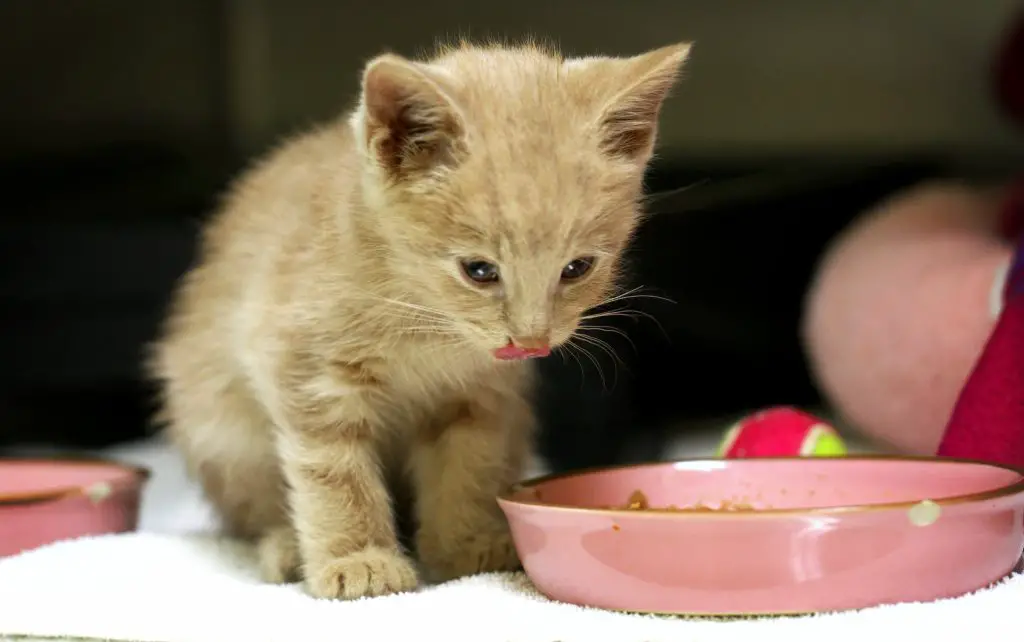
If your cat is lethargic but still eating, it could be a sign of a serious health issue. Cats can become lethargic due to a variety of conditions, including kidney disease, diabetes, food poisoning, and more.
However, if your cat just now appeared to be lethargic and that is not her normal self, here are some reasons why this could be happening:
1. Dehydration
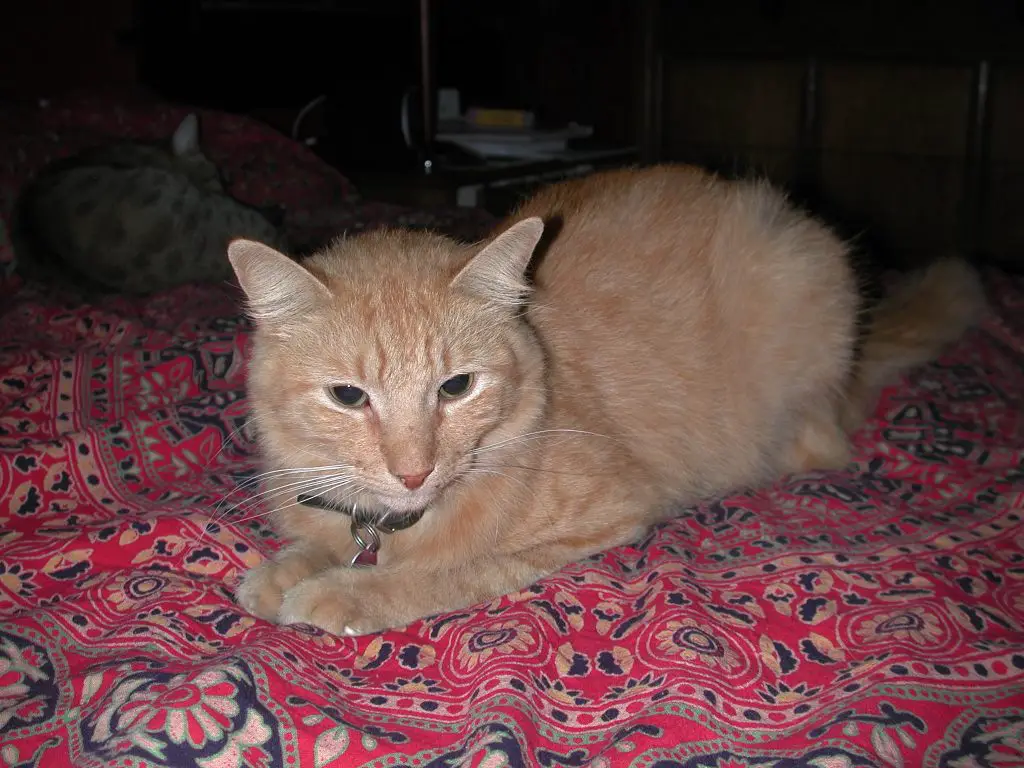
Dehydration can lead to a number of different health problems in cats, including lethargy. If your cat is showing signs of dehydration, it’s important to take them to the vet right away.
Treatment for dehydration will vary depending on the severity of the condition but may include fluids and electrolytes. In severe cases, hospitalization may be necessary. With prompt treatment, most cats make a full recovery. However, if left untreated, dehydration can be fatal.
2. Infection
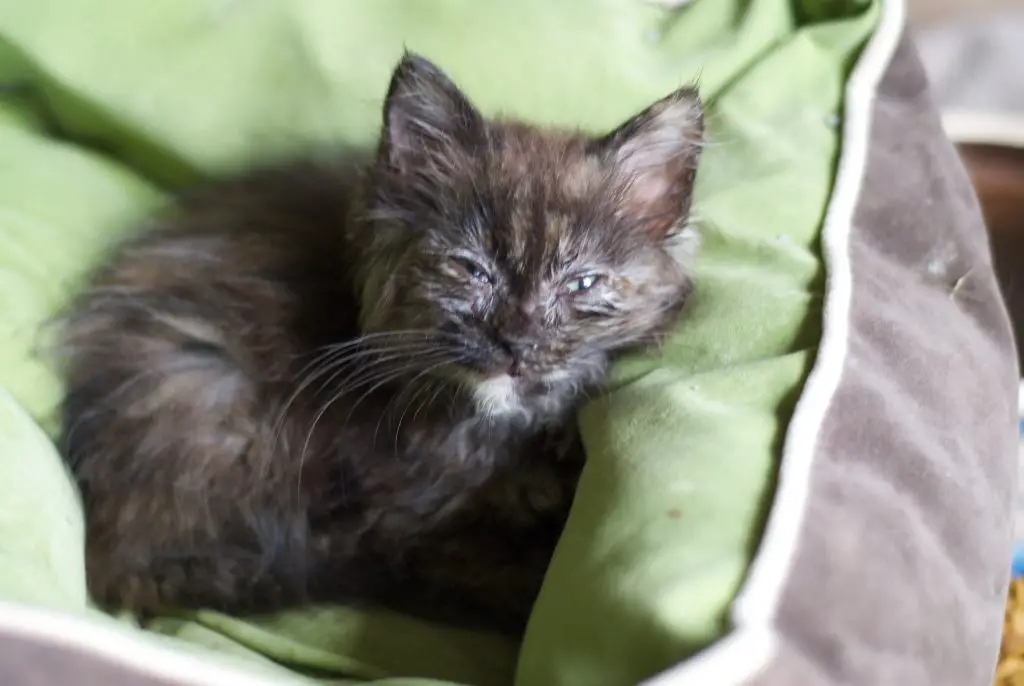
A cat can become lethargic due to an infection. Infections can cause a variety of symptoms in cats, including fever, and lethargy. If your cat is displaying any of these symptoms, it is important to take them to the vet for an examination.
Treatment for an infection will vary depending on the type of infection your cat has contracted. However, with prompt treatment, most cats will make a full recovery.
The most common types of infections that can cause a cat to be lethargic are upper respiratory infections, such as colds, and gastrointestinal infections.
These types of infections can make a cat feel tired and weak but don’t always affect their appetite. If your cat is lethargic and has any other symptoms, such as diarrhea or vomiting, it is important to take them to the vet so it can be properly diagnosed and treated.
3. Cancer
Cancer can make a cat become lethargic. The disease can cause the body to weaken and tire easily. In addition, some types of cancer can release toxins into the bloodstream, which can lead to feelings of fatigue.
If your cat is showing signs of lethargy, it’s important to have him checked out by a veterinarian to rule out any underlying health problems says PetMD.
4. Kidney disease
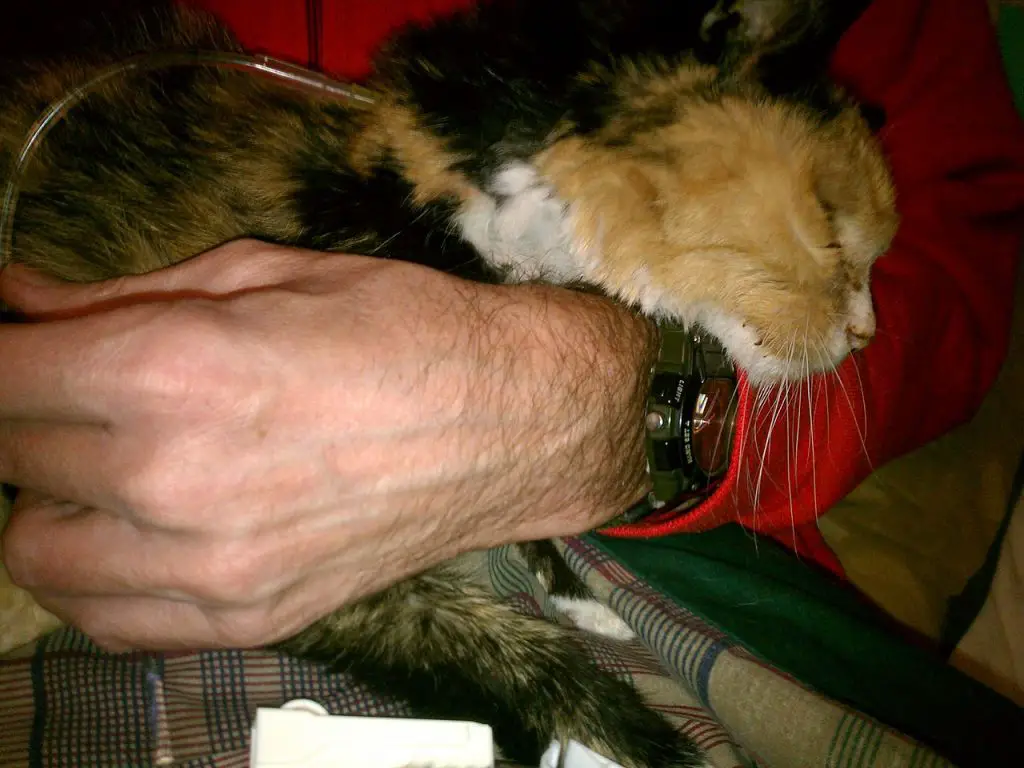
A cat can become lethargic due to kidney disease. Kidney disease is a common health problem in cats, and it can lead to a number of different symptoms, including lethargy. Kidney disease is treatable, but it’s important to catch it early so that treatment can be started as soon as possible.
Kidneys serve many purposes in the feline body. They help to filter waste products from the blood, produce hormones that regulate blood pressure, and produce red blood cells.
Additionally, they help to maintain fluid balance in the body and keep the bones healthy. Cats with kidney disease may experience a variety of symptoms, including weight loss, increased thirst, increased urination, lethargy, and vomiting.
5. Liver disease
The liver is responsible for a variety of tasks in the body, including filtering toxins from the blood, producing bile to help with digestion, and storing nutrients. In cats, the liver also helps to break down fat. A healthy liver is essential for a long and happy life for your cat!
A cat can become lethargic due to liver disease. The liver is responsible for many important functions in the body, including filtering toxins from the blood and producing bile to help with digestion. When the liver is not functioning properly, it can cause a build-up of toxins in the blood, which can make a cat feel tired and sluggish.
There are a few things that you can do to help keep your cat’s liver healthy. First, make sure they have regular checkups with their veterinarian. Second, feed them a high-quality diet that is appropriate for their age and activity level. And lastly, provide them with plenty of fresh water to drink.
6. Thyroid disease
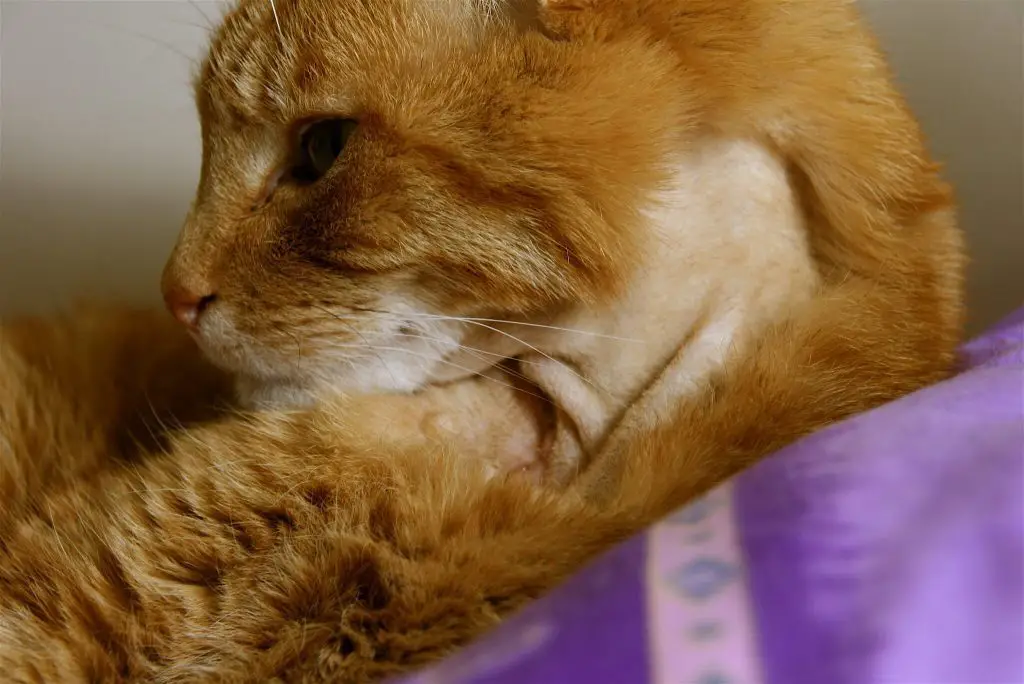
A cat can become lethargic due to Thyroid disease. The thyroid is a gland that produces hormones that regulate the body’s metabolism. When the thyroid doesn’t produce enough of these hormones, the body’s metabolism slows down, causing the cat to become lethargic.
The thyroid is a small, butterfly-shaped gland that sits low in the front of the neck. Its main job is to produce thyroid hormones, which help regulate the body’s metabolism.
When the thyroid doesn’t produce enough of these hormones, it’s known as hypothyroidism. Hypothyroidism can cause a number of problems in cats, including weight gain, lethargy, and skin problems.
Cat Lethargic and Not Eating But Drinking Water
If your cat is not eating but drinking water, it could be a sign of an underlying medical condition. Common causes of lethargy in cats include infections, dehydration, kidney disease, diabetes, and food poisoning. It’s important to take your cat to the vet as soon as possible if you notice any signs of lethargy or changes in its behavior.
Your vet will be able to perform tests and provide a diagnosis so that they can determine the best course of action for treating your cat’s condition.
In some cases, the cause may be something simple like stress or an upset stomach; however, it is always best to have your pet checked out by a professional just in case there is something more serious going on.
It is also important to make sure that your cat has access to plenty of fresh water and that they are eating a balanced diet with all the necessary nutrients they need to stay healthy.
If you suspect that your cat may be suffering from an illness or injury, contact your veterinarian right away for further advice and treatment options.
Why Is My Cat Lethargic And Not Purring?
If your cat is lethargic and not purring, it’s important to take note of any other symptoms they may be displaying. Lethargy can be a sign of a wide range of medical conditions, from minor illnesses to more serious diseases. Common causes of lethargy in cats include dehydration, anemia, diabetes, kidney disease, food poisoning, urinary tract infections, and respiratory infections.
It’s also possible that your cat is simply tired or stressed out due to changes in their environment or routine.
It’s important to take your cat to the vet if they are exhibiting signs of lethargy for more than 24 hours. Your vet will be able to perform tests and diagnose the underlying cause of your cat’s lethargy.
Treatment options vary depending on the cause but may include antibiotics for infections or dietary changes for digestive issues.
In addition to taking them to the vet, there are some things you can do at home to help your cat feel better.
Make sure they have access to plenty of fresh water and food as well as a comfortable place to rest. If possible, try providing them with extra warmth by using a heating pad or blanket. You can also provide them with extra attention and affection – cats love being petted and cuddled!
When Should I Worry About My Cat’s Lethargy?
If your cat has been lethargic for two days in a row, it is time to start worrying. If your cat is lethargic, it may be a sign of an underlying medical condition. If your cat is normally active and suddenly becomes lethargic, it is important to consult your veterinarian.
Lethargy can also be caused by stress, so if you notice that your cat is more lethargic than usual, try to identify any possible sources of stress in its environment. If you are unable to determine the cause of your cat’s lethargy, or if it persists for more than a few days, visit the veterinarian.
What Can I Feed My Lethargic Cat?
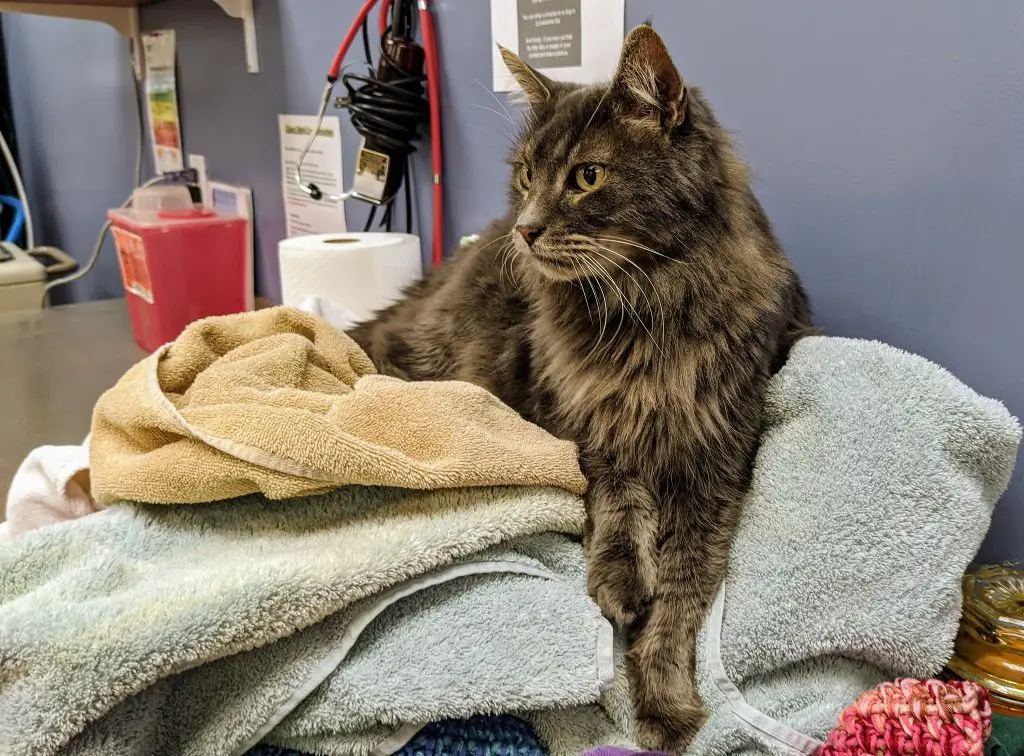
If your cat is lethargic, it may be because they’re not feeling well. Check with your veterinarian to see if there’s an underlying health issue causing their fatigue. If not, there are a few things you can do to help perk up your kitty.
1. Boiled chicken
Cats are obligate carnivores, meaning that they require animal protein to survive. A diet lacking in animal protein can lead to health problems for your cat. Boiled chicken is a great source of lean protein for cats, and it’s easy to prepare at home.
To make boiled chicken for your cat, start by boiling a whole chicken in water until it’s cooked through. Remove the chicken from the water and allow it to cool before removing the skin and bones. Cut the meat into small pieces and serve immediately, or store in the fridge for up to two days.
2. Cottage cheese
Cottage cheese is an excellent source of protein for cats and can be easily prepared at home. Here are some tips on how to prepare cottage cheese for your feline friend:
- Choose a good-quality cottage cheese that is low in sodium and fat.
- If you are using a block of cottage cheese, cut it into small cubes or slices.
- You can also mash the cottage cheese with a fork to make it easier for your cat to eat.
- Add a little bit of water to the cottage cheese to create a smooth consistency.
- Give your cat fresh, clean water to drink alongside the cottage cheese.
3. Bland foods
Being obligate carnivores, a cat’s diet should consist mostly of meat. However, sometimes cats have to eat bland food for medical reasons. If your cat is on a bland diet, don’t despair – there are ways to make it more palatable.
Here are some tips for making bland food more appealing to your feline friend:
- Add some wet food or canned tuna. Wet food has a stronger smell and taste than dry food, so it can help make bland food more appetizing. A canned tuna is also a good option – just be sure to get tuna in water, not oil.
- Mix in some chicken broth. Chicken broth adds flavor and moisture to dry food, making it more palatable for cats.
- Add a little bit of meat. If your cat is on a bland diet due to illness, you may be able to add a small amount of cooked, shredded chicken or turkey to the food. This will give them some much-needed protein and make the food more enjoyable.
- Try different brands and flavors of wet food. Some cats are pickier than others, so it may take some trial and error to find a wet food that your cat likes. Once you find one they enjoy, stick with it – variety is not necessarily the key when it comes to bland diets!
How To Take Care Of a Lethargic Cat
Taking care of a lethargic cat generally involves improving its diet, providing necessary supplements, and potentially seeking medical intervention such as intravenous fluids or oxygen therapy if required.
Recognizing Lethargy in Cats
It’s important to understand the signs of lethargy in cats. These can include decreased activity, lack of interest in play, reduced appetite, and excessive sleeping. If your cat is showing these symptoms, it may be experiencing lethargy.
Causes of Lethargy
Lethargy can be caused by various factors, including illness, injury, aging, or stress. If your cat’s lethargy persists for more than a day or two, it’s crucial to seek veterinary attention to determine the underlying cause and appropriate treatment.
Improving Diet and Supplements
A balanced and nutritious diet is vital for maintaining your cat’s health and energy levels. Ensure your cat’s diet includes high-quality proteins, essential fatty acids, and other necessary nutrients. Supplements may also be beneficial, particularly if your cat has specific dietary deficiencies.
Medical Intervention
In some cases, medical intervention may be necessary to treat a lethargic cat. This could involve intravenous fluids to combat dehydration or oxygen therapy for respiratory issues. Always consult with a vet before starting any medical treatment.
Monitoring Your Cat’s Behavior
Regularly monitor your cat’s behavior and energy levels. Any sudden changes should be noted and discussed with a vet. Remember, early detection and treatment of health issues can significantly improve your cat’s prognosis.
FAQs
Q: Can cats be lethargic due to stress?
A: Yes, stress can be a cause of lethargy in cats. Cats can become stressed by various factors such as changes in their environment, introduction of new pets, loud noises, or even changes in their daily routine. When cats are stressed, it can affect their energy levels and overall behavior. If you suspect that your cat is experiencing stress, try to identify and address the source of the stress to help them regain their normal energy levels.
Q: Is it normal for older cats to be lethargic?
A: Yes, it is normal for older cats to be more lethargic compared to when they were younger. As cats age, their metabolism slows down, and they may naturally become less active. However, it’s important to monitor your older cat for any significant changes in their behavior or energy levels, as excessive lethargy can sometimes be a sign of an underlying health issue in senior cats.
Q: What are some common causes of lethargy in cats?
A: Some common causes of lethargy in cats include viral or bacterial infections, urinary tract infections, digestive issues, dental problems, anemia, hormonal imbalances, kidney disease, diabetes, and even certain medications. In some cases, cats may also show signs of lethargy after receiving vaccinations. If your cat is experiencing prolonged lethargy or other concerning symptoms, it’s best to consult with a veterinarian for proper diagnosis and treatment.
Q: Should I be concerned if my cat is lethargic?
A: While it’s normal for cats to take naps and have periods of rest, prolonged or excessive lethargy can be a cause for concern. If your cat’s lethargy is accompanied by other symptoms such as loss of appetite, vomiting, diarrhea, difficulty breathing, or noticeable changes in behavior, it’s important to consult with a veterinarian. They will be able to assess your cat’s overall health and provide appropriate treatment if necessary.
Q: What can I do to help my lethargic cat?
A: If your cat is lethargic, it’s important to first identify the underlying cause. If you suspect that it may be due to a minor illness or infection, make sure your cat is properly hydrated and provide them with a comfortable and quiet environment to rest. It may also be helpful to offer your cat their favorite food or treats to stimulate their appetite. However, if your cat’s lethargy persists or worsens, it’s best to seek veterinary attention for a proper diagnosis and treatment.
Q: Can I give my lethargic cat any medication?
A: It is not recommended to give any medication to your lethargic cat without first consulting with a veterinarian. While certain medications may be necessary for the treatment of specific health conditions, it’s important to have a professional evaluate your cat’s overall health and provide the appropriate medication and dosage if necessary. Giving your cat medication without proper veterinary guidance can be potentially harmful and may worsen their condition.
Q: How can I prevent my cat from becoming lethargic?
A: To help prevent your cat from becoming lethargic, it’s important to provide them with a healthy and balanced diet, regular exercise and playtime, and a stress-free environment. Regular check-ups with your veterinarian can also help detect any early signs of illness or underlying health issues. Additionally, maintaining proper hygiene and grooming practices can contribute to your cat’s overall well-being and energy levels.
Q: When should I seek veterinary attention for my lethargic cat?
A: If your cat’s lethargy persists for an extended period of time, is accompanied by other concerning symptoms, or if you’re unsure about the cause of their lethargy, it’s best to seek veterinary attention. A veterinarian will be able to perform a thorough examination, conduct any necessary tests, and provide appropriate treatment based on their findings.
In Conclusion
If your cat is lethargic but still eating, it can be a sign of a serious health issue. Take your cat to the vet right away so it can get the proper diagnosis and treatment they need.
Other possible causes include stress or anxiety, dehydration, electrolyte imbalances, and underlying medical conditions such as diabetes or kidney disease.
With prompt care from your veterinarian, you can help ensure that your cat recovers quickly and gets back on their feet again in no time!




